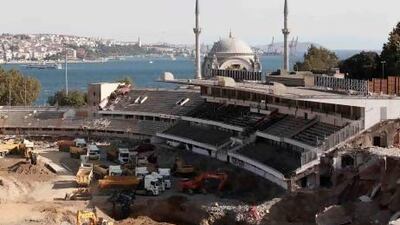Along the picturesque Bosphorus Straits dividing Europe and Asia, Istanbul is undergoing a transformation which should fill Turkey with confidence in its bid to become the first Muslim country to stage the Olympics in 2020.
Overlooking the waterway, mechanical diggers are tearing down Besiktas' Inonu Stadium to make way for a state-of-the-art facility earmarked to stage rugby in 2020, and to the north construction of the city's third suspension bridge is underway.
To the south, prime minister Tayyip Erdogan is scheduled to open in October a rail tunnel beneath the straits to keep up with the transportation needs of a fast-growing city of 14 million people. A huge third Istanbul airport is also planned.
But when the International Olympic Committee (IOC) votes on Saturday, the impressive development, Turkey's growing economic clout and the experience of a fifth Olympic bid in the last six elections could be undermined by a series of blows which have rained down on the Istanbul bid in recent months.
Anti-government protests have rocked Turkey, doping bans have been slapped on dozens of its athletes and turmoil in the Middle East is deepening with the prospect of US-led military intervention against neighbouring Syria.
Sports minister Suat Kilic remains upbeat about Istanbul's ability to beat off the challenge from Tokyo and Madrid, pointing to strong government support and the passion of the country's youth for the bid.
"With the enthusiasm of the Turkish youth and the dreams of our sportsmen and women, a voice inside me says it will happen this time," Kilic said. "The prime minister has dreamed of making Istanbul an Olympic city since the time he was the Istanbul mayor."
Erdogan, who plans to attend the IOC ceremony in Buenos Aires, has presided over a period of unprecedented prosperity during his decade in power and a vote in Istanbul's favour would give him a boost ahead of an election cycle beginning next year.
The IOC report on Istanbul praised the government backing, wide public support and its capability to deliver construction for the Games on time with a massive projected infrastructure budget of US$19.2 billion (Dh70.5bn), including building legacy projects.
However, the report was drafted before protests against Erdogan's government which erupted in June after police used tear gas and water cannon against campaigners opposed to plans to redevelop Istanbul's central Gezi Park.
A mechanical digger being used in the stadium redevelopment project was commandeered at one point by demonstrators in a protest against riot police guarding the prime minister's nearby offices.
The unrest nationwide left four people dead, including a policeman, and injured thousands, denting many Turks' confidence in their ability to win the Olympic bid.
"The Gezi protests were definitely negative and the foreign media exaggerated them," said school teacher Ahmet Macit, 23, as he relaxed on a bench on a sunny day in now peaceful Gezi Park.
"But I think they could do it. The prime minister has stood firmly behind the project. The economy is going well, they're building new stadiums, a third airport," he added.
Government concerns about the effect of the demonstrations were also laid bare by minister for EU affairs Egemen Bagis, who said last month the protesters would be to blame if Istanbul's bid was unsuccessful.
Another growing worry for Istanbul has been a series of high-profile doping cases which have resulted in the Turkish Athletics Federation banning 32 athletes for drugs violations, most recently double European 100-metres hurdles champion Nevin Yanit.
Olympic 1,500 metres champion Asli Cakir Alptekin, who had already served a two-year doping ban, was provisionally suspended in May after abnormalities were detected in her "biological passport".
But Kilic said Turkey's "zero tolerance" for doping, illustrated by the bans, should be viewed positively by the IOC.
"If the doping incidents influence Istanbul 2020 it should be in a positive way because Turkey's sporting administration has taken a clear stance in its fight against doping," he said.
Casting aside the negative media headlines, Turkey has focused instead on demonstrating its ability to hold major sporting events this year, staging both the Mediterranean Games and the Fifa Under 20 football World Cup.
As part of a major nationwide project to boost sporting activity, Turkey is currently developing some 24 stadiums, 179 sports centres, 42 swimming pools and 15 athletics facilities.
With some 31 million of the population aged under 25, Ankara is hoping that investment will yield greater sporting success, but much will depend on next week's vote.
Follow us

